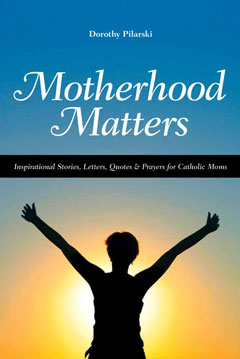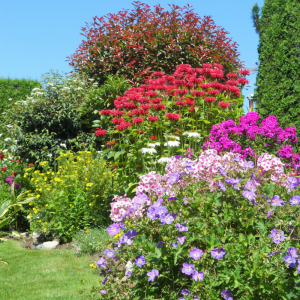
“The glory of gardening: hands in the dirt, head in the sun, heart with nature. To nurture a garden is to feed not just on the body, but the soul.” –Alfred Austin
A garden is a teacher of life’s great lessons; namely, that variety breeds beauty, that good fruit is born of hard work, and that nature has its own rhythm to be trusted. My father’s garden is set apart in its manifestation of these.
With a house sitting on almost a quarter acre of land, Pops, as I affectionately call my father, had a good chunk of space to work with. Growing up, our backyard was simple: a large stretch of green grass and a long, rectangular plot of dirt for growing vegetables. But when Pops retired, he transformed the plain, practical space into a living masterpiece.
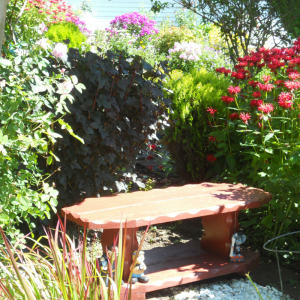
Variety
A garden is made more beautiful by a variety of plants and trees—it’s the many different colours and kinds that make it so attractive. It’s a bit like our world—if everyone were a cardboard cutout of each other, how boring it would be! It’s our different personalities, ethnicities, and idiosyncrasies that make the world interesting and exciting. So too with Pops’ garden, which has as its pinnacle the pink magnolia tree, shading the area where we gather: “the red square” (dubbed so for its brick base). Transplanted from the front yard, and dotted throughout the oasis of the backyard, are pink, purple, and blue hydrangea bushes.
Narrow pathways of the green lawn wind around the now-colourful space, lined with phlox, roses, rhododendrons, a Japanese willow, evergreens, a cherry tree, english laurel, lilac, yellow forsythia, potentillas, red and pink weigela, echinacea, and a diversity of bushes from Rose of Sharon, to viburnum, camellia, and spirea, and, even, heavenly bamboo.
Hard Work
One of the things I love about Pops is that he’s a fighter—it’s a tribute to his Scottish nature, for there’s 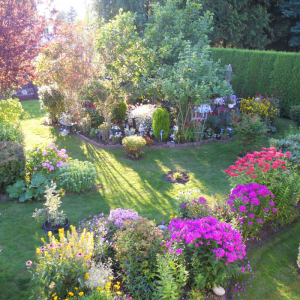 naturally a bit of “Braveheart” in every Scot’s blood. His determination and sheer will power conquered his lack of knowledge when it came to gardening.
naturally a bit of “Braveheart” in every Scot’s blood. His determination and sheer will power conquered his lack of knowledge when it came to gardening.
Pops is self-taught. To him, not knowing something isn’t an obstacle; it’s an opportunity to learn. As retirement brought a slower pace of life, Pops took the time to teach himself how to garden. Reading gardening magazines and looking at pictures would give him some ideas. Others came from his imagination—and creativity and hard work brought things to life.
I asked him how he knew what to do, and he said from his study along with simply planting at his own discretion, learning another life lesson: the need to be flexible. Pops told me, “Sometimes you realize, like all gardeners do, that you plant stuff in the wrong place, and so you have to change it around, but that’s trial and error and learning from experience. Some plants like shade and some plants like sun, and just like humans they need to be fed, as well as get haircuts (pruning!).”
It took years of persistence, “practice making perfect,” and the reality of time for the garden to take on a life of its own, but now it is a magnet for those desiring to be surrounded by beauty.
Nature
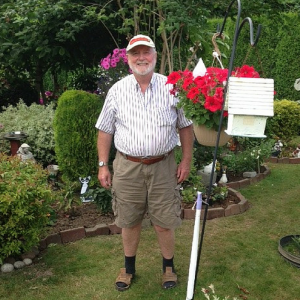 I asked pops what gardening taught him, and he said, “The amazing hardiness of creation.” When I asked him what he liked most about his garden, he explained, “Seeing all the flowers and trees bloom in the spring. You look in the winter and think everything is dead and think it won’t come back again, but in the Spring you wander around and you see signs of life coming from the earth and all of a sudden, one day, it just shoots into bloom.”
I asked pops what gardening taught him, and he said, “The amazing hardiness of creation.” When I asked him what he liked most about his garden, he explained, “Seeing all the flowers and trees bloom in the spring. You look in the winter and think everything is dead and think it won’t come back again, but in the Spring you wander around and you see signs of life coming from the earth and all of a sudden, one day, it just shoots into bloom.”
I think we need to trust nature more. In a world of technology, we often attempt to change the natural instead of letting it be, letting it teach us to weather storms and embrace changing seasons. That’s not to say all things natural should be left wild—pruning is important, but it is to say that life has its own rhythms and routines worth embracing and growing from.
Immersing oneself in nature affords an opportunity to reflect on this. And a garden, in particular, attracts contemplative souls to such musings, as well as to embrace nature’s beauty, something Pops’ garden does naturally, drawing birds and insects of all kinds along with Pops’ family and friends.
In fact, if the flowers, bushes, and trees of the Garden of Stephen could talk, they would tell tales of countless souls that have basked in its serenity, ladies who have enjoyed tea time, hummingbirds who have drunk from its nectar, and children who have played amidst its magic. It is a sight to behold and a work of art to experience.
“Flowers always make people better, happier, and more helpful; they are sunshine, food and medicine for the soul.” –Luther Burbank
Stephanie Gray is an inspirational speaker who has presented across Canada and the United States, as well as in England, Ireland, Latvia, and Costa Rica. Learn more at www.stephaniegray.info.
Stephanie Gray is an inspirational speaker who has presented across Canada and the United States, as well as in England, Ireland, Latvia, and Costa Rica. Learn more at www.stephaniegray.info



